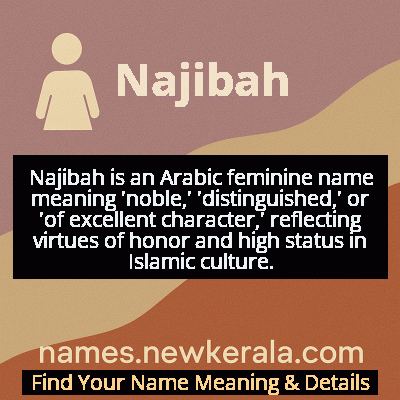Najibah Name Meaning & Details
Origin, Popularity, Numerology Analysis & Name Meaning of Najibah
Discover the origin, meaning, and cultural significance of the name NAJIBAH. Delve into its historical roots and explore the lasting impact it has had on communities and traditions.
Name
Najibah
Gender
Female
Origin
Muslim
Lucky Number
9
Meaning of the Name - Najibah
Najibah is an Arabic feminine name meaning 'noble,' 'distinguished,' or 'of excellent character,' reflecting virtues of honor and high status in Islamic culture.
Najibah - Complete Numerology Analysis
Your Numerology Number
Based on Pythagorean Numerology System
Ruling Planet
Mars
Positive Nature
Generous, passionate, energetic, and humanitarian.
Negative Traits
Impulsive, impatient, moody, and can be overly emotional.
Lucky Colours
Red, maroon, scarlet.
Lucky Days
Tuesday.
Lucky Stones
Red coral, garnet.
Harmony Numbers
1, 2, 3, 6.
Best Suited Professions
Military, sports, philanthropy, leadership roles.
What People Like About You
Courage, energy, leadership, generosity.
Famous People Named Najibah
Najibah al-Awadhi
Judge and women's rights activist
First female judge in Kuwait's constitutional court and prominent advocate for women's legal rights in the Gulf region
Najibah Sultani
Humanitarian worker
Afghan women's rights activist and director of humanitarian organizations focusing on education and healthcare for women and children
Najibah Mohammed
Academic and writer
Professor of Islamic studies and author of several books on women in Islamic history, bridging traditional scholarship with modern feminist perspectives
Najibah bint al-Harith
Historical figure
Companion of Prophet Muhammad known for her piety and noble character, mentioned in historical Islamic texts for her virtuous life
Name Variations & International Equivalents
Click on blue names to explore their detailed meanings. Gray names with will be available soon.
Cultural & Historical Significance
Throughout Islamic history, women bearing this name have often been associated with leadership, education, and community service, reflecting the name's aspirational nature. The name appears in various historical texts and genealogical records, particularly among Arab, Persian, and South Asian Muslim communities where it continues to symbolize both inherited nobility and earned distinction. In many Muslim cultures, naming a daughter Najibah expresses parents' hopes that she will grow to be a woman of substance who contributes positively to her community while upholding traditional values of honor and integrity.
Extended Personality Analysis
Women named Najibah are typically perceived as possessing innate dignity and refined character. They often exhibit natural leadership qualities combined with emotional intelligence, making them effective in both professional and personal relationships. Their 'noble birth' meaning translates psychologically into self-assurance without arrogance, and they tend to carry themselves with grace under pressure. Najibahs are frequently described as intellectually curious, with strong analytical abilities and a tendency toward excellence in their chosen fields.
These women often demonstrate remarkable resilience and the ability to overcome challenges while maintaining their core values. Their combination of intelligence, dignity, and compassion makes them natural mentors and community leaders who inspire others through both words and actions. Many Najibahs develop strong moral compasses early in life and are known for their fairness in judgment and ability to see multiple perspectives. They typically value deep, meaningful relationships over superficial connections and often become the emotional anchors in their families and social circles. Their noble character manifests not through entitlement but through genuine concern for others' wellbeing and commitment to making positive differences in their communities.
Modern Usage & Popularity
In contemporary times, Najibah maintains steady popularity among Muslim communities worldwide, particularly in the Middle East, South Asia, and among diaspora communities in Western countries. While not among the most common Muslim names, it enjoys consistent usage among families valuing traditional Arabic names with profound meanings. The name has seen a slight resurgence in recent years as many Muslim parents seek names that combine cultural heritage with aspirational qualities. In countries like Malaysia, Indonesia, and Turkey, variations of the name have gained popularity through cultural exchange. Modern Najibahs often excel in professional fields including law, medicine, education, and social activism, living up to the name's meaning of distinction. Social media and global connectivity have helped maintain the name's relevance, with many young Najibahs creating positive digital footprints that reinforce the name's association with achievement and noble character. The name's elegant sound and positive meaning ensure its continued relevance, though it remains more common in educated, urban Muslim families who appreciate its historical and linguistic depth.
Symbolic & Spiritual Meanings
Symbolically, Najibah represents much more than just noble birth - it embodies the concept of earned nobility through character and achievement. The name symbolizes the Islamic ideal that true nobility comes from moral excellence and service to others, not merely lineage. Metaphorically, it represents the flowering of human potential, suggesting that every individual carries innate greatness waiting to be realized. In spiritual contexts, the name signifies being chosen or selected for higher purposes, reflecting the Islamic concept that each soul has a unique destiny and responsibility. The name also represents cultural continuity and the transmission of values across generations, serving as a living connection to historical traditions of learning and leadership among Muslim women. Symbolically, Najibah embodies the perfect balance between honoring one's heritage while actively contributing to progress and positive change in society. It stands as a testament to the enduring power of names to shape identity and aspiration across centuries and cultures.

